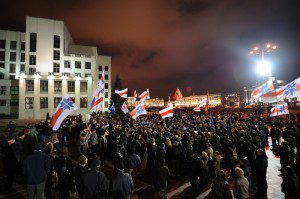Dictatorship: it’s a man’s game
Lukashenko’s Belarus is a perfect example of the machismo and misogny at the heart of authoritarian regimes, says Maryna Koktysh (more…)
Lukashenko’s Belarus is a perfect example of the machismo and misogny at the heart of authoritarian regimes, says Maryna Koktysh (more…)
In an authoritarian state, the regime uses loyal religious institutions to impose strict control over society and oppress freedom of conscience. Zmitser Yanenka reports from Belarus
(more…)

Opposition protesters in Minsk in 2010. Kseniya Avimova | Demotix
Europe’s last dictatorship plans even tighter controls over citizens’ access to the digital world, Index shows in a new report (more…)
Europe’s last dictatorship uses violence, repressive legislation and economic discrimination to silence independent journalists. Yanina Melnikava reports
(more…)